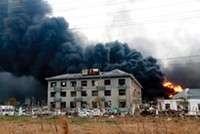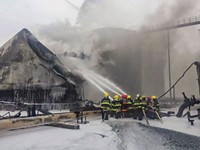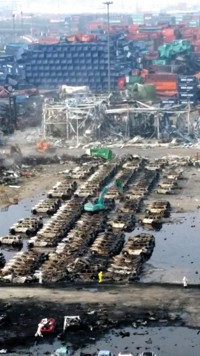Advertisement
Grab your lab coat. Let's get started
Welcome!
Welcome!
Create an account below to get 6 C&EN articles per month, receive newsletters and more - all free.
It seems this is your first time logging in online. Please enter the following information to continue.
As an ACS member you automatically get access to this site. All we need is few more details to create your reading experience.
Not you? Sign in with a different account.
Not you? Sign in with a different account.
ERROR 1
ERROR 1
ERROR 2
ERROR 2
ERROR 2
ERROR 2
ERROR 2
Password and Confirm password must match.
If you have an ACS member number, please enter it here so we can link this account to your membership. (optional)
ERROR 2
ACS values your privacy. By submitting your information, you are gaining access to C&EN and subscribing to our weekly newsletter. We use the information you provide to make your reading experience better, and we will never sell your data to third party members.
Safety
Tianjin Blasts Kill 114 People
Industrial Accident: Environmental questions, protests follow explosions involving hazardous chemicals
by Jean-François Tremblay , Marc S. Reisch
August 20, 2015
| A version of this story appeared in
Volume 93, Issue 33

Chinese authorities have confirmed that at least 114 people have perished in the explosions involving hazardous chemicals that occurred in the port of Tianjin on Aug. 12.
Although authorities have also insisted that chemical releases into the environment were limited, local residents claimed falling rain caused skin burns and white foam formed on roads a few days later near the blast site. Some residents have also held demonstrations demanding compensation for property damage and more information on relatives unaccounted for in the disaster.
Despite the confusion and displacement of people living and working near the site of the disaster, authorities say the sprawling port resumed operations on Aug. 18. Chemical producers in the area say they are working normally.
Officials still haven’t indicated what they suspect as the cause of the explosions. However, they revealed that among the hundreds of tons of about 40 different chemicals stored at the Ruihai International Logistics hazardous chemicals warehouse at the center of the explosions were large quantities of ammonium nitrate. Commonly used as a fertilizer, ammonium nitrate is also explosive and the cause of numerous industrial accidents such as the 2013 explosion at West Fertilizer Co. in Texas that killed 15 people.
Officials’ main concern, however, has been disposing of hundreds of tons of sodium cyanide, which releases flammable and toxic hydrogen cyanide gas on contact with water or acids, that they said was stored at the warehouse. The chemical is used in the mining industry to extract gold and other precious metals.
The Supreme People’s Procuratorate, China’s top prosecutorial office, is investigating the explosions in an effort to determine whether Ruihai was operating legally. Authorities say they have detained 10 senior executives of the company that owned the Ruihai warehouse.
The Tianjin Environmental Protection Bureau says it had deployed hundreds of officers to monitor air and water quality at and near the blast site in the Binhai industrial park. The bureau detected cyanide exceeding safety standards by more than 10 times in wastewater coming from the Binhai industrial zone.
But the bureau said the public was not at risk because the water could be contained. Levels of air pollution near the blast area were comparable to what they are on normal days, it emphasized.





Join the conversation
Contact the reporter
Submit a Letter to the Editor for publication
Engage with us on Twitter